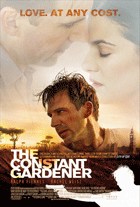 Director: Fernando Meirelles
Director: Fernando Meirelles
Duration: 129 minutes
Year: 2005
Key words: Pharmaceutical industry, corporate power, developing world
Summary: Justin Quayle uncovers disturbing evidence of cooperation between the British Government and a corrupt pharmaceutical company working in Kenya whilst investigating the mysterious murder of his wife, Tess.
Degree of public health theme coverage: This is a thriller that has as a background theme the fictionalised portrayal of how a pharmaceutical company exploits the situation of African's dying from HIV/AIDS to test a new anti-tuberculosis (TB) drug (which has serious adverse effects). The UK Government colludes with this – with corruption and other illegal activities via spies etc. It is based on a John Le Carré novel. Other specific public health components include:
- Refers to the impact of HIV and TB (including scenes of dying people).
- The pressures on pharmaceutical companies to cut corners to maximise return on new drugs.
- Shows the lack of health services with people in long queues for some intervention (possibly immunisation).
- Images of crowded slum life in Nairobi, Kenya.
- A new use of the term “axis of evil” – ie, applied to multi-nationals.
- One of the spies (who smokes Marlboro and displays the brand of the pack on one occasion) is dying of cancer. This might be an example of “product placement” in reverse.
- Illegality of homosexuality in Kenya. Score=3/5
Sophistication of analysis of public health content: The analysis is not particularly deep. But there are snippets of the pharmaceutical industry issues arising from the interaction of the characters with a German-based “pharma-watch” NGO. The reasons why the UK Government would risk this engagement are just hinted at ie, some trade-off benefit to help another government. The Kenyan Government officials are apparently bribed to allow the pharmaceutical company in.
Some analysis might seem quite stereotypical and superficial to some people (eg, the actions of the doctor involved in the drug trial – who subsequently left for Sudan). Score=3/5
Potential for empowerment and use of advocacy: The work of the pharma-watch NGO is shown – and to some extent the main characters actually were able to post out a report on the situation. At the end there was some exposure of the UK Government complicity in the situation. Nevertheless, three of the main characters are threatened and killed as a result of their investigative work (Justin is also beaten up and Arnold is tortured). The problems of working in this country – with the corruption and violence is also rather off-putting in terms of advancing advocacy. Score=2/5
Persuasiveness of the movie: The overall theme of the movie is reasonably persuasive given that it is fairly public knowledge that “Big Pharma” can suppress information and do other covert activities to get new products to market (eg, the Vioxx saga). Similarly, how governments work with industry to allow illegal deals is also public knowledge (eg, the UK Government and an arm's company selling weapons to Saudi Arabia).
But some of the plot twists in the movie are rather implausible eg, the sudden attack on the village beside the airport in Sudan. Score=3/5
Engagement and cinematic quality: The movie is very engaging. The thriller aspect is quite intense and perhaps not to the taste of some people. The acting is very good and the movie has a fast pace. The flashbacks worked well. There are quite a lot of very close “close ups” – perhaps too many for some viewers? Some of the shots of life in Africa and of the scenery were stunning. Score=4/5
Total score = 15/25
Questions for discussion:
- How plausible is the theme of Big Pharma's actions in this developing country?
- How plausible is the theme of the UK Government being complicit in this illegal activity?
- Does this movie give you hope that these type of problems can ever be dealt with?
Other information:
- There is a Wikipedia article on this movie - found here (this article includes criticism of the movie)
- The trailer can be seen on YouTube - found here
- The book that the film is based on is described in a Wikipedia article - found here
- Back to Films in Undergraduate Public Health Teaching home page
CONTACT US
Associate Professor Nick Wilson
Department of Public Health
University of Otago, Wellington
PO Box 7343
Wellington South 6242
New Zealand
Tel: +64 4 385 5541 ext 6469
Fax: +64 4 389 5319
Email: nick.wilson@otago.ac.nz
